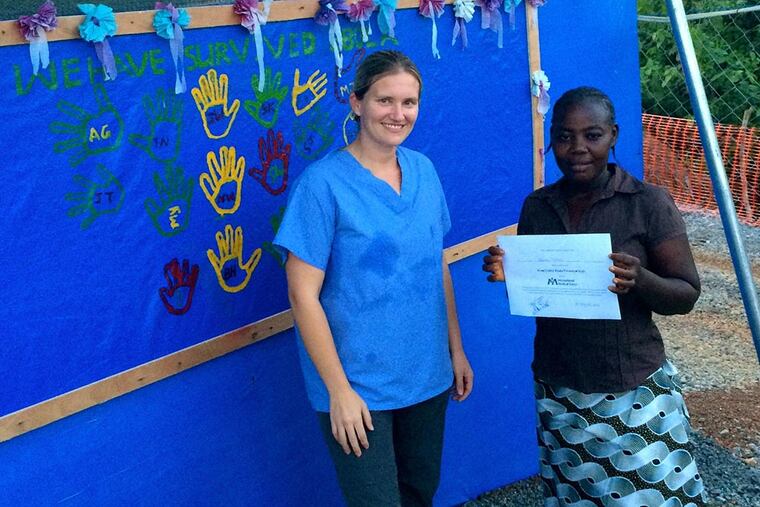Penn doctor: Fear 'definitely hampered' response to Ebola
Trish Henwood, the University of Pennsylvania emergency-room physician who twice went to Liberia to fight Ebola, says global intervention - albeit too late - still saved hundreds of thousands of lives.

Trish Henwood, the University of Pennsylvania emergency-room physician who twice went to Liberia to fight Ebola, says global intervention - albeit too late - still saved hundreds of thousands of lives.
She also says the frantic reaction here showed U.S. leaders that improving health systems in fragile African nations is in our national security interest.
Henwood, who gave Penn's annual Global Distinguished Lecture on Tuesday evening, told a rapt audience that fear too often trumped science and "definitely hampered the response . . . and led to more panic than preparedness."
As of last week, there have been 25,175 reported cases of Ebola virus in Liberia, Guinea, and Sierra Leone, and 10,445 deaths. The peak of the epidemic was last fall, when Henwood, 34, made her first visit.
"I think the general public probably thinks it's over," Henwood said.
But it's not. She said 150 new cases were reported in those three countries two weeks ago, and 79 last week, the fewest since the epidemic started.
The disease spread rapidly because "this was the first time this region dealt with Ebola." Initial symptoms - headache, fever, nausea - seemed flulike.
That is, in part, why so many doctors and nurses in Liberia died. Sick people went to hospitals and infected the staff before anyone recognized why they were ill.
Henwood said one of the saddest aspects was that Liberia's fledgling health-care system was just beginning to see dramatic improvement. The number of doctors there had soared from 51 in 2008 to 290 when the epidemic struck. More than 100 doctors died from Ebola, she said.
"The highest amounts of deaths came from contact with dead bodies," she said, which are extremely contagious and "spewing virus." It took tremendous effort in communication to reach remote areas and explain that cherished burial rituals were in fact deadly.
Henwood, who attended Academy of Notre Dame high school in Villanova, Georgetown University, and Thomas Jefferson University Medical School, traveled to Liberia twice, first in the fall to Bong County in the north, and again in January to an Ebola treatment facility closer to Monrovia, the capital.
She rode in an ambulance picking up patients in the rural areas, and also supervised a treatment facility that at its peak had more than 200 workers.
Henwood, director of global initiatives in Penn's emergency medicine department, said that in the U.S., where patient care is the clinician's top priority. In Liberia, it was fourth.
First, she said, was protecting yourself. Second was protecting your medical staff. Third was trying to break the cycle of transmission and preventing the spread of the disease.
She said fighting Ebola was a team effort. The person who mixes chlorine - the most effective disinfectant - and the person who sprays it on workers and clothing are just as important as doctors and nurses.
She said Ebola is deadly but also fragile, and can be controlled with proper care. "You can't be afraid on a daily basis," she said. "That hampers your ability to do your job well."
She said protective suits were essential but also hot. She had a colleague who after his shift would pour a liter of sweat from each boot.
Although Penn supported her decision to go, she said, there was a "really limited response of academic medical centers" around the U.S. to the outbreak. "There needs to be a mechanism in place to support people going," she said.
There is talk of creating a "reserve medical corps" of emergency-room physicians, infectious-disease specialists, nurses and others to intervene in global health emergencies and epidemics, she said.
Henwood said fear and misinformation accounted for part of the reason so few American doctors and nurses went to Africa. Another was the restrictive quarantine policies - policies she and other experts say are based on fear, not science.
In February, Henwood testified before a presidential commission.
"At times it felt more challenging to actually coordinate our return to the United States than to do our Ebola related work in West Africa," she said then.
Only people with active symptoms can spread Ebola, she explained. Careful monitoring by the individual or by a public health agency - taking one's temperature every hour or two - is adequate to detect symptoms.
Yet, she told the commission, many returning health workers stay away from family members not because they fear contagion, but because they worry loved ones will be shunned.
"In fact that's why I returned to the United States the day after my large family's Thanksgiving celebration,'' she said.
Henwood leaves for work in East Africa - where she will focus on her specialty, the use of ultrasound technology in low-resource settings - on Friday.
215-854-5639 @MichaelVitez